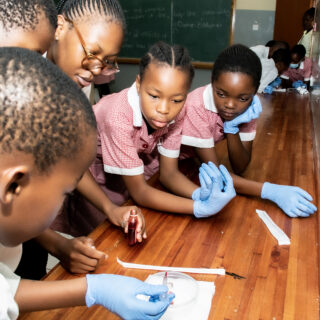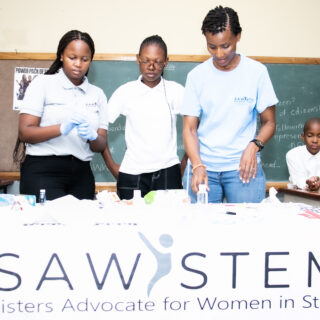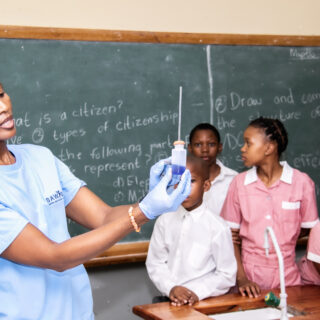Homemade Thermometers
Temperature measurement
In a recent STEM workshop organized by Sawstem, students at Morphane Primary School were introduced to the fascinating world of temperature measurement. This workshop provided them with a hands-on opportunity to create homemade thermometers and made connections to their recent field trip to the local Weather Centre.
Using simple materials such as rubbing alcohol and food colouring, students created their DIY thermometers. These homemade thermometers respond to changes in temperature by having the liquid inside the bottle expand and move up the narrow neck, providing a visual indication of the temperature change.
The DIY thermometer experiment reinforced key STEM concepts such as thermal expansion and provided a hands-on way for students to explore the science of temperature measurement. By engaging in this experiment, students gained a deeper understanding of how temperature is measured and the factors that affect it.
This DIY thermometer experiment is also connected to the students' recent field trip to the local Weather Centre. During the field trip, students learned about the various instruments and
Using simple materials such as rubbing alcohol and food colouring, students created their DIY thermometers. These homemade thermometers respond to changes in temperature by having the liquid inside the bottle expand and move up the narrow neck, providing a visual indication of the temperature change.
The DIY thermometer experiment reinforced key STEM concepts such as thermal expansion and provided a hands-on way for students to explore the science of temperature measurement. By engaging in this experiment, students gained a deeper understanding of how temperature is measured and the factors that affect it.
This DIY thermometer experiment is also connected to the students' recent field trip to the local Weather Centre. During the field trip, students learned about the various instruments and
DIY thermometer
technology used in meteorology, including how temperature is measured. By creating their homemade thermometers, students were able to apply what they learned during the field trip and gain a deeper understanding of the science behind temperature measurement.
During the workshop, students were enthusiastic and engaged as they experimented. They were excited to see the liquid inside the bottle rise and fall in response to changes in temperature. This hands-on experience sparked their curiosity and encouraged them to ask questions about the science behind the experiment.
The STEM workshop organized by Sawstem provided students at Morphane Primary School with a fun and educational opportunity to learn about temperature measurement. By creating homemade thermometers and making connections to their recent field trip to the Weather Centre, students gained a deeper understanding of key STEM concepts and developed a greater appreciation for the science of temperature.
Keywords: Sawstem, STEM workshop, Morphane Primary School, homemade thermometer, thermal expansion, temperature measurement, hands-on experiment.
During the workshop, students were enthusiastic and engaged as they experimented. They were excited to see the liquid inside the bottle rise and fall in response to changes in temperature. This hands-on experience sparked their curiosity and encouraged them to ask questions about the science behind the experiment.
The STEM workshop organized by Sawstem provided students at Morphane Primary School with a fun and educational opportunity to learn about temperature measurement. By creating homemade thermometers and making connections to their recent field trip to the Weather Centre, students gained a deeper understanding of key STEM concepts and developed a greater appreciation for the science of temperature.
Keywords: Sawstem, STEM workshop, Morphane Primary School, homemade thermometer, thermal expansion, temperature measurement, hands-on experiment.
Acknowledgement Statement
This research was supported by the Sub-Saharan African Network for TB/HIV Research Excellence (SANTHE) which is funded by the Science for Africa Foundation to the Developing Excellence in Leadership, Training and Science in Africa (DELTAS Africa) programme [Del-22-007] with support from Wellcome Trust and the UK Foreign, Commonwealth & Development Office and is part of the EDCPT2 programme supported by the European Union; the Bill & Melinda Gates Foundation [INV-033558]; and Gilead Sciences Inc., [19275]. All content contained within is that of the authors and does not necessarily reflect positions or policies of any SANTHE funder. For the purpose of open access, the author has applied a CC BY public copyright licence to any Author Accepted Manuscript version arising from this submission.

Science Fun
Temperature measurement
In a recent STEM workshop organized by Sawstem, students at Morphane Primary School were introduced to the fascinating world of temperature measurement. This workshop provided them with a hands-on opportunity to create homemade thermometers and made connections to their recent field trip to the local Weather Centre.
Using simple materials such as rubbing alcohol and food colouring, students created their DIY thermometers. These homemade thermometers respond to changes in temperature by having the liquid inside the bottle expand and move up the narrow neck, providing a visual indication of the temperature change.
The DIY thermometer experiment reinforced key STEM concepts such as thermal expansion and provided a hands-on way for students to explore the science of temperature measurement. By engaging in this experiment, students gained a deeper understanding of how temperature is measured and the factors that affect it.
This DIY thermometer experiment is also connected to the students' recent field trip to the local Weather Centre. During the field trip, students learned about the various instruments and
Using simple materials such as rubbing alcohol and food colouring, students created their DIY thermometers. These homemade thermometers respond to changes in temperature by having the liquid inside the bottle expand and move up the narrow neck, providing a visual indication of the temperature change.
The DIY thermometer experiment reinforced key STEM concepts such as thermal expansion and provided a hands-on way for students to explore the science of temperature measurement. By engaging in this experiment, students gained a deeper understanding of how temperature is measured and the factors that affect it.
This DIY thermometer experiment is also connected to the students' recent field trip to the local Weather Centre. During the field trip, students learned about the various instruments and
DIY thermometer
technology used in meteorology, including how temperature is measured. By creating their homemade thermometers, students were able to apply what they learned during the field trip and gain a deeper understanding of the science behind temperature measurement.
During the workshop, students were enthusiastic and engaged as they experimented. They were excited to see the liquid inside the bottle rise and fall in response to changes in temperature. This hands-on experience sparked their curiosity and encouraged them to ask questions about the science behind the experiment.
The STEM workshop organized by Sawstem provided students at Morphane Primary School with a fun and educational opportunity to learn about temperature measurement. By creating homemade thermometers and making connections to their recent field trip to the Weather Centre, students gained a deeper understanding of key STEM concepts and developed a greater appreciation for the science of temperature.
Keywords: Sawstem, STEM workshop, Morphane Primary School, homemade thermometer, thermal expansion, temperature measurement, hands-on experiment.
During the workshop, students were enthusiastic and engaged as they experimented. They were excited to see the liquid inside the bottle rise and fall in response to changes in temperature. This hands-on experience sparked their curiosity and encouraged them to ask questions about the science behind the experiment.
The STEM workshop organized by Sawstem provided students at Morphane Primary School with a fun and educational opportunity to learn about temperature measurement. By creating homemade thermometers and making connections to their recent field trip to the Weather Centre, students gained a deeper understanding of key STEM concepts and developed a greater appreciation for the science of temperature.
Keywords: Sawstem, STEM workshop, Morphane Primary School, homemade thermometer, thermal expansion, temperature measurement, hands-on experiment.
Acknowledgement Statement
This research was supported by the Sub-Saharan African Network for TB/HIV Research Excellence (SANTHE) which is funded by the Science for Africa Foundation to the Developing Excellence in Leadership, Training and Science in Africa (DELTAS Africa) programme [Del-22-007] with support from Wellcome Trust and the UK Foreign, Commonwealth & Development Office and is part of the EDCPT2 programme supported by the European Union; the Bill & Melinda Gates Foundation [INV-033558]; and Gilead Sciences Inc., [19275]. All content contained within is that of the authors and does not necessarily reflect positions or policies of any SANTHE funder. For the purpose of open access, the author has applied a CC BY public copyright licence to any Author Accepted Manuscript version arising from this submission.




